Biblical Commentary
Ki Tavo: Conceptual Chronology
Wednesday, September 5, 2012 by Torah Talk with Michael Carasik | Jewish Ideas Daily » Weekly Portions
Mysteriously, the Israelites are exiled in the middle of Deuteronomy 28 but are still in their land as the chapter goes on. Is the Torah always written in chronological order? We'll let Nahmanides and Abarbanel tackle this problem. (Click here for source sheet.) Download | Duration: 00:12:08
 Sin, Sin, Sin
Sin, Sin, SinWednesday, August 29, 2012 by Lawrence Grossman | Jewish Ideas Daily » Daily Features
In the current Hebrew month of repentance, it’s hard not to notice that we live in a culture that takes sin far less seriously than it used to. The formula “mistakes were made” has largely replaced the admission of personal responsibility.
 Jewish Ethics, from Ancient Bible to Modern Bus
Jewish Ethics, from Ancient Bible to Modern BusMonday, February 13, 2012 by Lawrence Grossman | Jewish Ideas Daily » Daily Features
The next time someone tells you that ethical behavior doesn't need a foundation in religious teaching, step onto an Israeli bus (it doesn't have to be the gender-segregated variety) or open a mass-circulation Israeli newspaper and see how religion puts Jewish ethics on steroids.
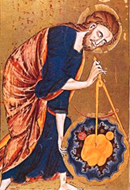 The Genesis of Modern Science
The Genesis of Modern ScienceTuesday, October 18, 2011 by David Curzon | Jewish Ideas Daily » Daily Features
Copernicus, Galileo, Kepler, Descartes, Newton, and the other founders of modern science were all believers in the truths of the opening chapter in the Hebrew Bible.
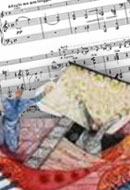 Jonah and the Music of Yom Kippur
Jonah and the Music of Yom KippurThursday, October 6, 2011 by Michael Carasik | Jewish Ideas Daily » Daily Features
Leviticus 10 tells us that Aaron's sons Nadav and Avihu died for bringing "strange fire" before the Lord in the wilderness. As a result of their deaths, according to Leviticus 16, God instructed Moses to ordain an annual Day of Atonement.
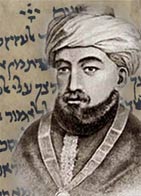 Who Owns Maimonides?
Who Owns Maimonides?Wednesday, October 5, 2011 by Joshua Halberstam | Jewish Ideas Daily » Daily Features
Abraham Joshua Heschel once suggested that if one didn't know that "Maimonides" was a person, one would assume it was the name of a university. Heschel was referring to the monumental breadth and influence of the 12th-century philosopher's work.
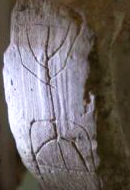 Mysteries of the Menorah
Mysteries of the MenorahThursday, September 8, 2011 by Meir Soloveichik | Jewish Ideas Daily » Daily Features
On the eve of Tisha b'Av, 2011, archeologists revealed artifacts newly unearthed from the great Jewish revolt against Rome (67–70 C.E.), including coins minted by the rebels and a stone incised with a sketch of the Temple menorah. But what is the menorah, and what does it symbolize?
 The Bible and the Good Life
The Bible and the Good LifeThursday, July 14, 2011 by Aryeh Tepper | Jewish Ideas Daily » Daily Features
What manner of work is the Hebrew Bible? The 17th-century freethinker Baruch (Benedict) Spinoza had an answer. As part of his war to emancipate philosophy from the influence of religion, he reduced the biblical message to, in effect, one word: obedience.
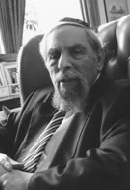 The Reluctant Renegade
The Reluctant RenegadeTuesday, July 12, 2011 by Elliot Jager | Jewish Ideas Daily » Daily Features
Since its founding, Conservative Judaism in the U.S. has defined itself in sharp contrast to Reform, pursuing a more religiously centrist and Zionist middle course. Its UK parallel, Masorti ("traditional") Judaism, was born as a secession movement from Orthodoxy—inspired by theologian Louis Jacobs.
 What is Aggadah, and How to Read It
What is Aggadah, and How to Read ItThursday, July 7, 2011 by Elli Fischer | Jewish Ideas Daily » Daily Features
Although the Talmud is best known for its discourse on religious law, its pages contain a vast amount of non-legal material, including ethical teachings, interpretations of biblical narratives (midrash), and excurses on topics from brain surgery to dream interpretation.
Editors' Picks
The Bible, for Non-Believers Hayyim Angel, Tradition. In his commentary on the Torah, Leon Kass does not begin from the premise that the text is divinely revealed. But he makes a strong case that man cannot live by reason alone.
Returning to Eden Brennan Breed, Marginalia. Biblical critics have long insisted that we view the Bible only in its original, "authentic" context. But there was never a single original context, as the critical approach to Genesis itself testifies.
Criticizing the Biblical Critics James Kugel, Kavvanah. Modern biblical criticism, for all its sophistication, treats "only the literal meaning of the Bible’s words on the page, divorced from Judaism’s age-old traditions of interpretation." (Interview by Alan Brill)
Amos Hakham’s Song , Seforim Blog. “The love portrayed in the Song of Songs is untainted and pure. It is entirely within the bounds of that which is appropriate, permissible, and accepted”: the distinct scholarly voice of the recently deceased “most popular man in Israel.”
Digitalmud Elli Fischer, Shai Secunda, Jewish Review of Books. Attempts to clarify the Talmud have always provoked new waves of commentary and dispute. Rashi's monumental running commentary opened the door for more sophisticated analysis. What might the ArtScroll app provoke?
The Macaronic Talmud Yair Furstenberg, Talmud Blog. The rabbis of the Talmud were not only exposed to Greek, but proficient enough to cunningly manipulate the language with wordplay and puns.
Homosexuality and Halakhah Michael Gold, MyJewishLearning. What do traditional Jewish sources actually say about homosexuality?
I'm Waiting for the Ham Raphael Fuchs, Jewish Press. Some Jewish sources suggest that pig will one day be kosher. Come again?
Trailing the Rabbis' Breadcrumbs Judith Shulevitz, Tablet. What is man? He who is capable of searching inside himself. What does he search for? Some dark or foreign matter that he has put there himself. With what does he search? The light of God, which is also in himself.
Darwin and the Rabbis Michael Kay, Thinking through My Fingers. We're told that "religion" and "science" went head to head over evolution. But nineteenth-century rabbis, including Samson Raphael Hirsch, Hermann Adler, and Abraham Isaac Kook, were all willing to engage with Darwinism.

